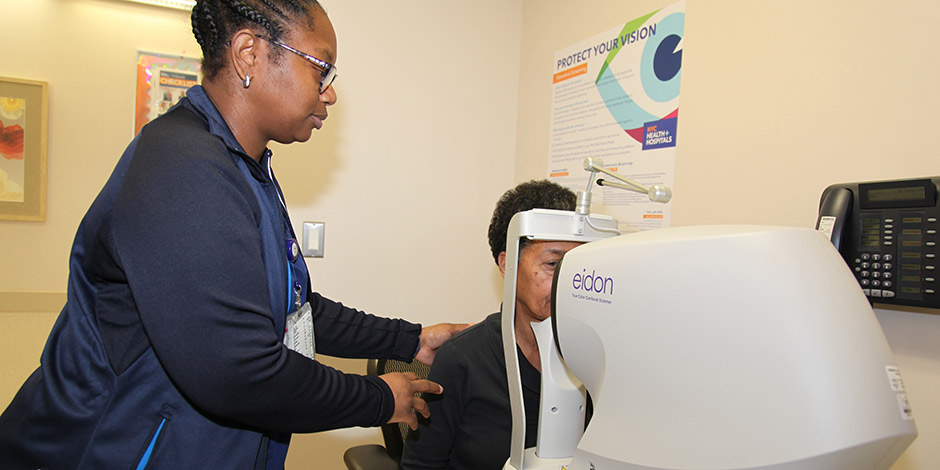As Diabetes Awareness Month Comes to an End, NYC Health + Hospitals Announces Initial Outcomes of New Teleretinal Screenings
Live at NYC Health + Hospitals/Coney Island, Elmhurst, Lincoln, Queens, and Woodhull, 1,886 patients with diabetes have been screened for signs of diabetic retinopathy Teleretinal machines are able to quickly detect evidence of diabetic retinopathy, which ensures that patients access treatment early to help prevent vision loss NYC Health + Hospitals plans to expand teleretinal screening services to all its hospitals in 2020
Nov 27, 2019

As Diabetes Awareness Month comes to an end, NYC Health + Hospitals announces initial outcomes of new teleretinal screenings. Live at adult primary care clinics in NYC Health + Hospitals/Coney Island, Elmhurst, Lincoln, Queens, and Woodhull since August, 1,886 patients with diabetes have been screened for signs of diabetic retinopathy. Diabetic retinopathy is a disease of the retina, and if left untreated can result in loss of vision. Diabetic retinopathy may not cause symptoms immediately, which makes early detection the best way to prevent or treat vision loss in patients. Of the 1,886 screened in the teleretinal screening program, approximately 30 percent of patients were referred to ophthalmology for further testing to confirm diagnosis of diabetic retinopathy. Previously patients would have had to schedule an appointment with their ophthalmologist to receive this test. Patients with diabetes can develop diabetic retinopathy, the leading cause of blindness in United States adults aged 20 to 74. NYC Health + Hospitals plans to install teleretinal screening machines in all 11 acute care facilities, select NYC Health + Hospitals/Gotham Health sites, and Correctional Health by the end of 2020.
“Our new teleretinal screening approach changes the way patients with diabetes are evaluated for retinopathy,” said Dave Chokshi, MD, Vice President and Chief Population Health Officer at NYC Health + Hospitals. “Time is of the essence when identifying retinal changes – before irreversible damage is done to someone’s vision. Teleretinal screening is one more way we are ‘meeting patients where they are,’ particularly in primary care.”
“All patients with diabetes, regardless of duration or control, are at risk for significant retinopathy and vision loss. By providing easy access to teleretinal screening services at our primary care sites, we can provide patients important preventive care in a more convenient way,” said Ronni Lieberman, MD, NYC Health + Hospitals/Queens Director of Ophthalmology.
Annual retinal screening is an important component of comprehensive diabetes care as recommended by the American Diabetes Association and American Academy of Ophthalmology guidelines. Sites that offer teleretinal screening conduct the screening during a patient’s routine primary care appointment. If the patient is deemed appropriate for screening, the primary care provider physician places the order and a patient care associate takes photos of the eye. The screening takes five to 10 minutes and does not require a patient’s eyes to be dilated. Photos are sent to the ophthalmologist through the system’s electronic medical record and are reviewed within the following five business days. If the ophthalmologist suspects diabetic retinopathy, the patient is contacted for a specialty follow up appointment to fully assess, diagnose, and begin treatment, as necessary.
Teleretinal screening builds on the public health system’s focus on diabetes prevention and treatment, which include recent investments in self-management technology, integrating clinical pharmacists in primary care, and growing chronic disease nurses that drive much of the patient management services. In addition to these new initiatives, NYC Health + Hospitals offers expert diabetes care at all acute health facilities and neighborhood health centers, which may include education classes, one-on-one sessions, and patient support groups. NYC Health + Hospitals/Kings County, Jacobi, Lincoln, Metropolitan, North Central Bronx, and Queens, as well as NYC Health + Hospitals/Gotham Health, Sydenham, are accredited for providing high-quality, evidence-based education to patients with diabetes.
The teleretinal cameras and supporting IT infrastructure is funded through the Digital Healthcare Network grant awarded by New York State Department of Health. At least two existing patient care associates at each site were trained on how to use the machine to help facilitate the screening.
The prestigious accreditation from the American Association of Diabetes Educators or the American Diabetes Association verifies that the hospitals’ programs meet national standards for diabetes self-management education, which have been shown to be cost-effective and improve clinical outcomes and patients’ quality of life.
Nearly one million New Yorkers have diabetes, and about 19 percent are undiagnosed. Uncontrolled diabetes can cause blindness, chronic kidney disease, or lower extremity amputations in adults. Obese New Yorkers are two times more likely as other adults to have diabetes. Black, Hispanic, and Asian New Yorkers are also at least twice as likely to have diabetes as white New Yorkers. The average medical expenditures for people with diagnosed diabetes are about $13,700 per year, with about $7,900 of this being attributed to diabetes management directly.